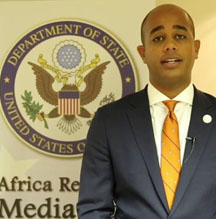
He was among other African specialist at the Second Annual C. Payne Lucas Africa Policy Forum organized by the Constituency for Africa (CFA) and the George Washington University for African Studies. Like Gachou, presenters including Florizelle Liser, President of the Corporate Council on Africa, gave frank pictures of Africa. Liser talked of how shocked she was when she first learned that Africa contributed only two percent to world trade and relieved that it had grown to three percent.
Gachou agreed that while the growth in gross domestic product (GDP) for many African countries exceeds that of the United States, they need to double the GDP to meet the needs of their growing populations. He suggested that African countries focus on IT, value added manufacturing, and logistics. The cost of transporting goods in the US, he explained, can be about seven percent of a product’s cost. In Africa, it can be between 70 to 80 percent of the costs.
Trade and transportation costs were also on the mind of Franklin Moore, who says that it has been more cost effective for Botswana to import cassava from Thailand than from Nigeria. “Trade is a critical engine for growth,” confirmed Liser.
However, America is falling behind in China in other ways including educating Africans. Today, says Gachou, “there are more African students in China than there are in the United States and Europe combined.”
Trade and transportation costs were also on the mind of Franklin Moore, who says that is has been more cost effective for Botswana to import cassava from Thailand than from Nigeria.
While the panelists were given short times to speak, all were straight and to the point including Don Rojas of the Africa Diaspora Roundtable who called for a “worldwide reparations movement.” He shared news of Antigue asking Harvard University for reparations. Kalidou Gadio of the Trade and Investment Roundtable suggested that the US create a non-reactive policy toward Africa and not one to counteract moves made by China or Russia.
The diverse group of Africanist shared their thoughts as the meeting’s organizers formulated their advocacy platform. The discussion will lead to agreements on key policy recommendations that the CFA should make to the U.S. Administration, the African Union, and also for the African Diaspora to advocate for in the coming year. We will work with anyone says Melvin Foote, CFA head, as long as you are “committed to Africa and African people.”
Note: Interested in increasing African trade revenue and keeping clean? If so, then buy Gambia River Soap from a group that the Port Of Harlem Gambian Education Partnership supports.






